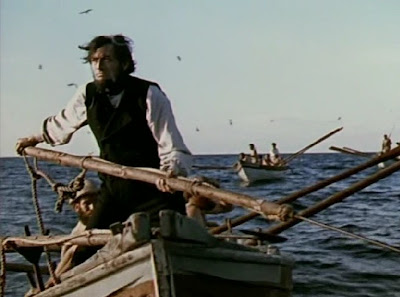Restless and bored with living on land, Ishmael feels drawn to the sea. The film follows him as he first encounters Queequeg, a cannibal and harpooner, in New Bedford at the Spouter Inn. They become friends and join the crew of the Pequod, a whaler whose captain is the mysterious and obsessed Ahab. The crew doesn't know it yet, but Ahab seeks revenge against Moby Dick, a great white sperm whale who has bit off Ahab's leg. The film follows the pursuit to its fateful conclusion, slightly altering Ahab's death for the better, and includes all of the most memorable scenes from the novel: Ishmael and Queequeg's first meeting, Father Mapples' rousing sermon, the strange Elijah's warning on the dock, sailing around Cape Hope in a typhoon, Queequeg's reading his future by tossing bones, spirited whale chases in longboats, and the final confrontation between man and beast.
 |
| The Pequod slips out of New Bedford Harbor. |
To give the action a contemporary look for the period, Huston and cinematographer Oswald Morris created a unique desaturated subdued pastel effect on the film stock. It works. At times it seems as if you are watching an old documentary, or looking over tintype or daguerreotype photos.
Peck, just 38 at filming, is unfairly criticized for his role. Some say he was miscast, others that he was too young. But he captures the madness of Ahab perfectly, using his deep voice to perfection. When this Ahab raises a wild eye brow and scowls at his crew as he begins to speak in the novel's signature prose, urging them onto the quest, you understand the character's magnetism and get a clear glimpse at his self-destructive maniacal nature. It takes a while for Ishmael to see the man for what he is. In one voice over he explains: "He did not feel the wind, or smell the salt air. He only stood, staring at the horizon, with the marks of some inner crucifixion and woe deep in his face."
First mate Starbuck (Leo Glenn) sees the danger in Ahab before any of the others, and in one passage touches on the novel's religious theme. He expresses his worry to two others:
Starbuck to Stubb and Flask: "It is an evil voyage, I tell thee. If Ahab has his way, neither thee nor me, nor any member of this ship's company will ever see home again."
Stubb: "Aw, come on, Mr. Starbuck, you're just plain gloomy. Moby Dick may be big, but he ain't THAT big."
Starbuck: "I do not fear Moby Dick - I fear the wrath of God."
In addition to Peck, the rest of the cast is just as effective, though Basehart is clearly too old for his role. Ishmael should be in his early 20's. Basehart was 41. It seems a strange choice, though perhaps Huston was impressed with his work in the acclaimed film, La Strada, two years earlier. Orson Welles is magnificent in a brief appearance as Father Mapples, as is Royal Dana as Elijah, whose prophecy on the dock should have warned Ishmael to find another boat.
"A day will come at sea when you'll smell land and there'll be no land, and on that day, Ahab will go to his grave, but he'll rise again, and beckon, and all save one shall follow".
Huston fills the film with little memorable touches: the camera pans across the church walls prior to Mapple's grim sermon to reveal the names of all the New Bedford men who have been lost at sea; Queequeg's face is heavily tattooed; and he changes the novel's ending to have Ahab's corpse beckon to the crew to continue the hunt. The captain has drowned and is lashed to Moby Dick's side by harpoon ropes. As the whale plows through the waves, Ahab's one loose arm flaps and appears to be calling the survivors onward. If some traditionalists decry a novel's alteration, this is one case where dramatic license improved the story.
New York Times film critic Bosley Crowther called the film "one of the great motion pictures of our times," and lauded its "lean and violent drama." It is Huston's most ambitious work. For his effort, the New York Film Critics named him Best Director of 1956.
 |
| Queequeg goes into a trance after reading his future in bones. |
The film ends as the novel does, with the lone survivor, Ishmael, floating half-dead on Queequeg's coffin, lamenting that he alone lives to tell the tale.
 |
| Peck as Ahab, waiting for his foe to rise. |

No comments:
Post a Comment